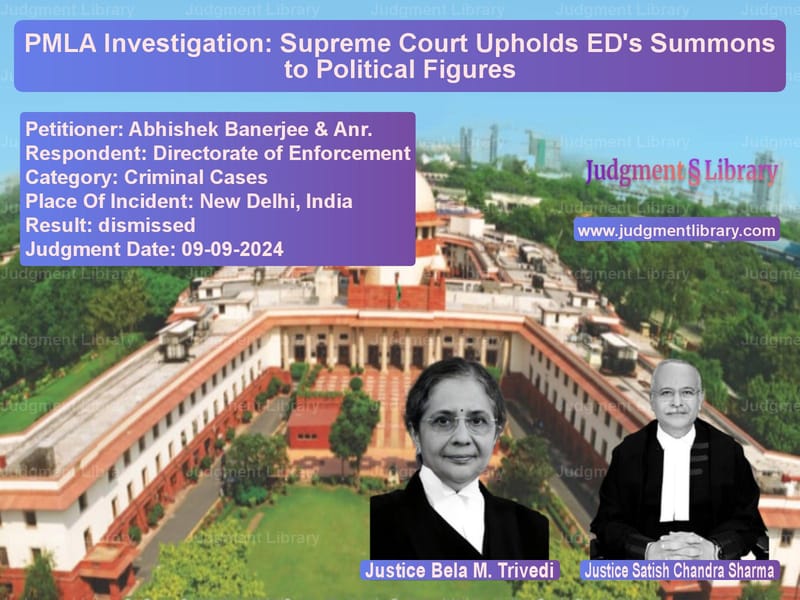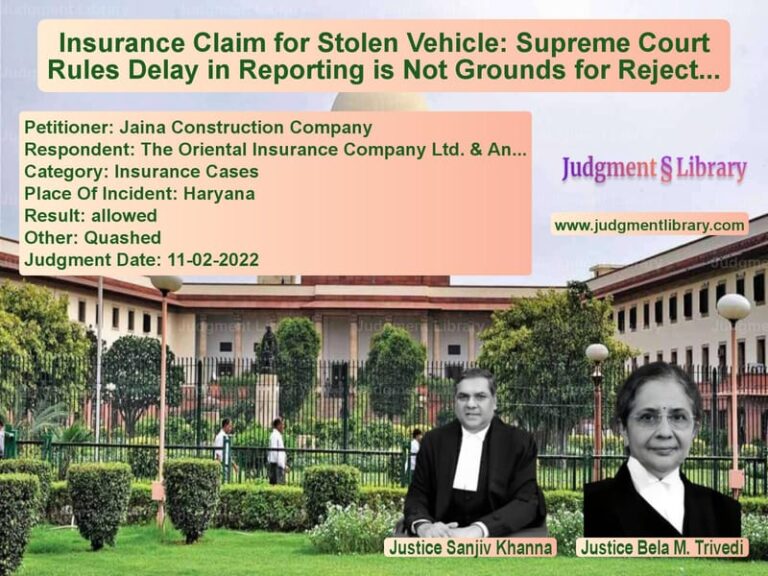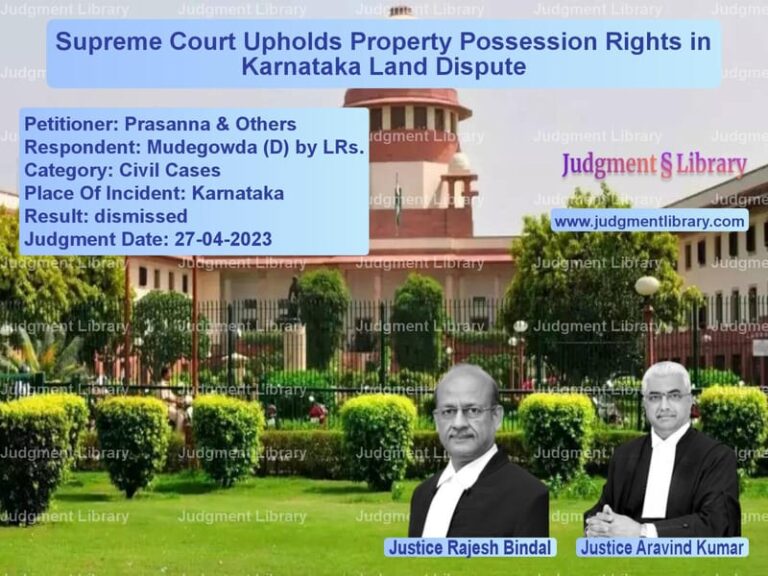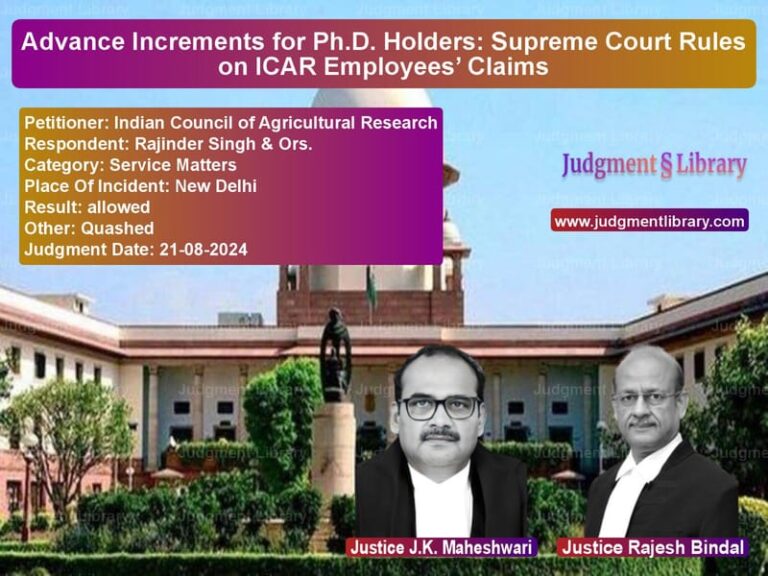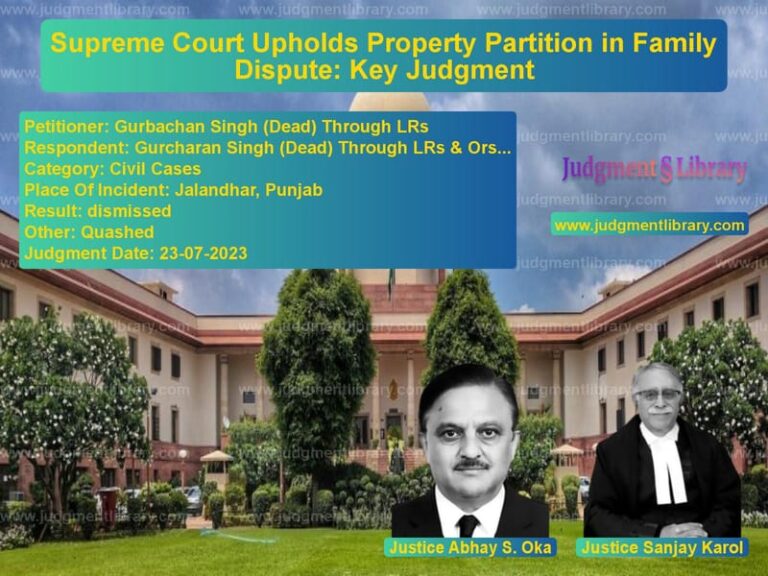PMLA Investigation: Supreme Court Upholds ED’s Summons to Political Figures
The case of Abhishek Banerjee & Anr. vs. Directorate of Enforcement involved the legal challenge to the Enforcement Directorate’s (ED) summons issued under Section 50 of the Prevention of Money Laundering Act, 2002 (PMLA). The appellants, prominent political figures, sought relief from the Supreme Court, arguing that the summons should have been issued within their domicile state rather than New Delhi. The Supreme Court upheld the ED’s actions, affirming its power to summon individuals anywhere in the country for investigation.
Background of the Case
The case stems from an investigation into an alleged coal smuggling operation in the leasehold areas of Eastern Coalfields Limited (ECL). The Central Bureau of Investigation (CBI) registered an FIR on November 27, 2020, under Sections 120B and 409 of the Indian Penal Code (IPC) and Sections 13(2) read with 13(1)(a) of the Prevention of Corruption Act, 1988.
Following this, the Enforcement Directorate (ED) initiated proceedings under PMLA, registering an Enforcement Case Information Report (ECIR) on November 28, 2020. The ED alleged that illegal coal mining operations resulted in money laundering amounting to Rs. 1300 crore, with significant amounts being funneled to political figures.
Key Legal Issues
- Does the ED have the authority to summon individuals outside their domicile state under Section 50 of PMLA?
- Can individuals refuse to comply with ED summons on grounds of inconvenience?
- Does non-compliance with a summons justify criminal proceedings under Section 174 of IPC?
Arguments by the Appellants
The appellants, represented by senior advocates, made the following arguments:
- The ED’s summons should be issued at the regional office located in their home state of West Bengal, as the alleged predicate offense occurred there.
- Section 50 of PMLA does not explicitly outline the procedure for issuing summons, unlike Section 160 of CrPC, which mandates that women and certain individuals cannot be summoned outside their domicile.
- The ED’s action of requiring physical presence in Delhi was a form of harassment and a violation of their fundamental rights under Article 21 of the Constitution.
- The proceedings were politically motivated, targeting individuals associated with opposition parties.
Arguments by the Respondent (Directorate of Enforcement)
The ED countered the appellants’ claims with the following arguments:
- The ED is not bound by CrPC provisions and has the authority under Section 50 of PMLA to summon individuals anywhere in India.
- Money laundering is a pan-India offense, and the investigation is not limited to a single jurisdiction.
- The ED’s investigation revealed that Rs. 168 crore was transferred from Kolkata to Delhi and overseas, establishing jurisdiction in multiple states.
- The procedural safeguards under CrPC do not apply to PMLA summons, and non-compliance can lead to prosecution under Section 174 of IPC.
Supreme Court’s Observations
1. Jurisdiction of the Enforcement Directorate
The Supreme Court ruled that the ED has the legal authority to issue summons to any individual across the country, irrespective of their place of residence:
“Section 50 of PMLA does not impose territorial restrictions on the ED’s powers. Given the magnitude of money laundering cases, requiring individuals to appear where the investigation is conducted is justified.”
2. No Gender-Based Protection Under PMLA
The Court rejected the argument that women cannot be summoned outside their domicile:
“Unlike Section 160 of CrPC, PMLA does not provide gender-based exemptions. The legislature, while framing PMLA, has consciously omitted such restrictions.”
3. Political Allegations Do Not Invalidate Proceedings
The appellants claimed political victimization, but the Court held:
“The argument of political motivation cannot override statutory provisions. If due process is followed, legal summons cannot be disregarded on this basis.”
4. Consequences of Non-Compliance
The Court affirmed that failure to comply with a legally issued summons could attract penal consequences:
“Section 174 of IPC applies to willful disobedience of a summons. An individual cannot refuse to appear merely because it is inconvenient.”
Final Judgment
The Supreme Court dismissed the appeals, upholding the Delhi High Court’s ruling:
“The summons issued by the Enforcement Directorate under Section 50 of PMLA are valid and must be complied with. Non-compliance may result in legal consequences under IPC.”
Impact of the Judgment
The ruling sets a strong precedent in money laundering cases:
- National Scope of ED’s Authority: The ED’s jurisdiction is not restricted by state boundaries.
- Compliance is Mandatory: Individuals must comply with ED summons, regardless of personal inconvenience.
- Gender-Neutral Provisions: Unlike CrPC, PMLA does not provide exemptions for women in summons cases.
- Political Allegations Do Not Invalidate Legal Proceedings: Courts will not entertain political bias claims if due process is followed.
This judgment strengthens the enforcement of PMLA and ensures that individuals under investigation cannot evade compliance by citing domicile-based technicalities.
Petitioner Name: Abhishek Banerjee & Anr..Respondent Name: Directorate of Enforcement.Judgment By: Justice Bela M. Trivedi, Justice Satish Chandra Sharma.Place Of Incident: New Delhi, India.Judgment Date: 09-09-2024.
Don’t miss out on the full details! Download the complete judgment in PDF format below and gain valuable insights instantly!
Download Judgment: abhishek-banerjee-&-vs-directorate-of-enfor-supreme-court-of-india-judgment-dated-09-09-2024.pdf
Directly Download Judgment: Directly download this Judgment
See all petitions in Money Laundering Cases
See all petitions in Fraud and Forgery
See all petitions in Bail and Anticipatory Bail
See all petitions in Judgment by Bela M. Trivedi
See all petitions in Judgment by Satish Chandra Sharma
See all petitions in dismissed
See all petitions in supreme court of India judgments September 2024
See all petitions in 2024 judgments
See all posts in Criminal Cases Category
See all allowed petitions in Criminal Cases Category
See all Dismissed petitions in Criminal Cases Category
See all partially allowed petitions in Criminal Cases Category

